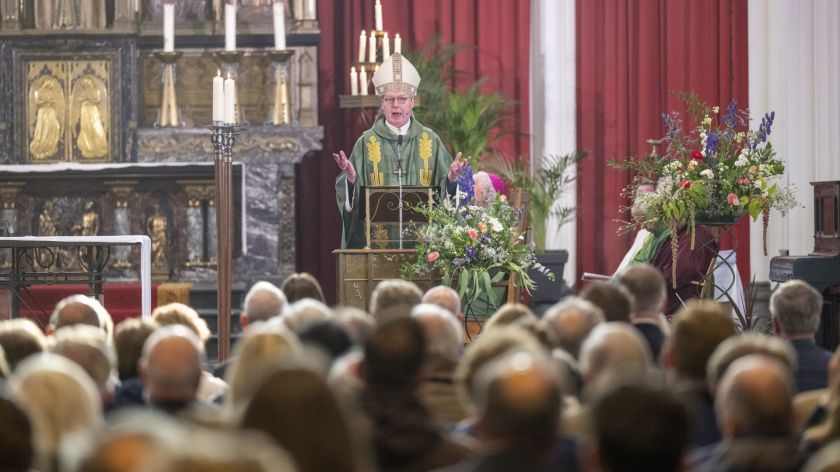Catholic scientists: ‘University must be a house of wisdom’
-
 The eucharist at Radboud University’s Dies Natalis. Photo by Bert Beelen
The eucharist at Radboud University’s Dies Natalis. Photo by Bert Beelen
The university shouldn’t only be a place of knowledge, but wisdom as well. That is the main line of reasoning in an upcoming book in which various catholic scientists discuss the university. ‘Universities can use their own unique profiles to hold themselves accountable both in- and externally’, according to editor Coban Menkveld.
After the schism between the Dutch Bishop’s Conference and the Catholic University Foundation in late 2020, Coban Menkveld, at the time an employee of the Titus Brandsma Institute, sat down and started writing. ‘That is because I noticed a certain shallowness in the responses to the schism’, Menkveld says.
The theology graduate decided to dive into the history of the university. His article, titled The deprivation of the ‘catholic’ designation of Nijmegen university: A cardinal mistake by the Bishop’s Conference, written for Streven magazine, was submitted to Gerard de Korte, the bishop of the Den Bosch diocese.
To his personal astonishment, Menkveld was invited for coffee in the episcopal palace in Den Bosch. In speaking with the bishop, the idea formed to invite professors of Radboud University, the KU Leuven, and Tilburg University – the three catholic universities of the lowlands – for discussions about science and faith’, as stated by Menkveld.
Pamphlet
The invitation received enthusiastic replies from, among others: Wim van Donk the rector magnificus for Tilburg University; Rik Torfs, former rector of the KU Leuven; and Nijmegen professors Sophie van Bijsterveld and Inigo Bocken. The so-called Den Bosch Forum, organised every two months, allows for participants to discuss the meaning and relevance of catholic doctrine to science. Every forum’s introduction has a new speaker.
The forum has resulted in a collection titled Bouwen aan een huis van wijsheid (‘Building a house of wisdom’, eds.), written with contributions from various forum members; the subtitle reads “Reflecties op de Universiteit vanuit een katholiek perspectief” (‘reflections on the university from a catholic perspective’, ed.). Bishop De Korte gifted the first issue to José Sanders, the new rector magnificus, at Radboud’s centenary celebrations.
The title of the collections derived from a statement by Gerard Brom (1882-1959), one of the co-founders of the Catholic University Nijmegen, as well as a significant catholic emancipator. ‘He wrote a pamphlet two years before the university’s founding, in which he referred to building a house of wisdom’, according to Menkveld. ‘I found it interesting to research the current Radboud University ‘s stance regarding that statement.’
Catholic social thought
A ‘house of wisdom’ implies a broader view of academia than merely the transferral of knowledge. ‘Universities are more than simply knowledge factories’, Menkveld says. ‘Bishop De Korte mentions in his introduction that science is never without personal values. There are always decisions to be made, especially in its application. It is important to emphasize the particularities.’
According to the bishop, those particularities are grounded in catholic social thought, which can stimulate and drive scientists. In the book, De Korte refers to the themes present in the encyclicals Laudato Si’ and Fratelli Tutti by Pope Francis, such as “striving for global social justice and proper stewardship of this world as God’s creation.” De Korte goes on to say that protecting human dignity, solidarity, and general wellbeing can help guide scientists in their research and education.
‘We feel it is important to make space for fundamental research without immediately visible benefits’
But is Radboud University a house of wisdom in 2023? ‘It is difficult to answer that question without a birds-eye view of the university’, Menkveld says. ‘We feel it is important to make space for fundamental research without immediately visible benefits, where knowledge needs no outside validation. As stated by Aristotle, this concerns knowledge for knowledge’s sake. Not everything in society needs to be useful. The Laudato Si’-institute is a good example of how that kind of wisdom remains visible. But I also see positive developments in fields other than theology.’
Outside perspective
According to the authors, it is important that the university works on its own profile. ‘Universities can use their own unique profiles to hold themselves accountable both in- and externally’, as stated by Menkveld. ‘Neutral research implies that you needn’t be held responsible for your actions, which is something we find undesirable.’
Radboud University especially has just come out of a long identity journey. However, the forum’s book is not a part of this journey. ‘Our project has an outside perspective’, Menkveld says. ‘We felt that the university was lacking in terms of contemplative- and philosophical research, and we wanted to contribute.’
The Den Bosch forum’s discussions will continue after the book’s publication, according to Menkveld. ‘The KU Leuven will celebrate its 600th birthday in 2025, and Tilburg University has its centenary in 2027. We might be able to publish two new books in the leadup to both birthdays.’
Bouwen aan een huis van wijsheid. Reflecties op de Universiteit vanuit een katholiek perspectief — edited by Coban Menkveld and Erik Borgman, published by Adveniat; the book is 216 pages long and can be purcahsed for €24.95.
Translated by Jasper Pesch



